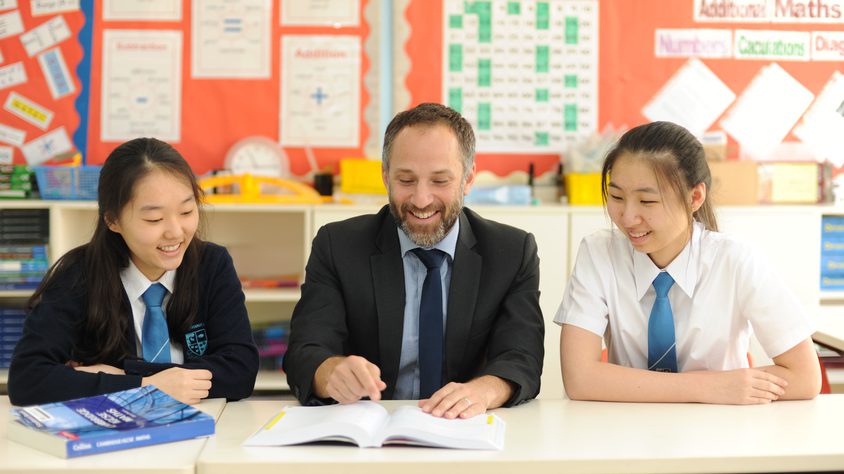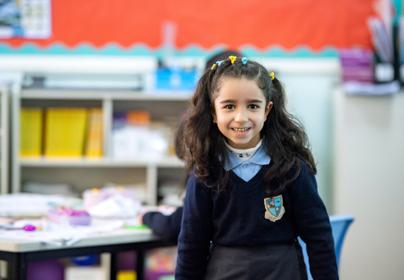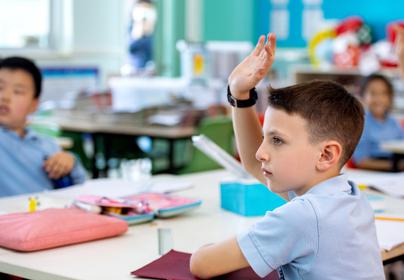Please briefly describe your journey to become a teacher at Britannica.
I graduated in 2007 with a PGCE from Manchester Metropolitan University, having previously studied my BSc at Liverpool University. I began teaching in my home city of Manchester. After building up experience teaching Mathematics in the UK I then moved into the international teaching circuit. Having previously taught in South America and other areas of Asia, I am now settled and enjoying life in Shanghai and working at Britannica and have recently signed on for a fifth year at the school. I am delighted to be part of this continually growing and diverse school as the Head of Mathematics. I am a keen sportsman and enjoy the competitive nature of all sports, especially football, badminton and cricket. Being an international teacher at Britannica has enabled me as an innovative and creative teacher, with a passion for my subject, to develop further. Additionally, I am lucky enough to enjoy working with students from diverse cultural and language backgrounds.
What do you enjoy most about being a Maths teacher?
I love my job as a maths teacher, not only because I get to teach a subject I am passionate about, but I also facilitate my students’ growth, development, and maturity, building their character as they become young adults. This holistic combination is very rewarding as every day I am blessed to work with young people who are constantly striving to become more knowledgeable and to improve themselves. More specifically, I enjoy being a mathematics teacher because it is enjoyable to help build the confidence of students in maths while helping them to realise the many ways to approach problem solving.
How does Britannica nurture the next generation of mathematicians?
At Britannica we recognise all of our students as individuals and support all levels of mathematicians. As a mathematics team, we appreciate the different levels of ability that our students have and endeavor to nurture the talents of our students. The next generation of mathematicians will need to become more efficient at critical thinking, problem solving and the application of knowledge to contexts in the real world. At Britannica, we have a rigorous mathematics programme taught in small classes, where the teachers differentiate for all abilities in the classroom. We also encourage students to love the process of learning mathematics, we do this through creative projects, investigations and interactive activities.
How have you engaged students with mathematics at Britannica?
It is vital all students have the ability to relate what we do in mathematics to the real world. We are able to encourage this by planning and delivering innovative lessons. For example, when learning geometry, we may use Google Earth to look at various marvels of architecture. When learning statistics, we look at current events such as The Olympics or The World Cup to predict when the next world records will be broken. I also believe that students learn best when they are asked to create something, to synthesize their knowledge in a fun, and engaging way such as making board games in our algebra unit or creating menus and recipes for ratios and proportions. We are constantly reflecting on our practice and developing new ways to engage students to maintain a high level of enthusiasm and love for maths.
What makes IGCSE and A-Level mathematics courses internationally recognised?
The IGCSE and A-level courses are both rigorous programmes where students are expected to have a broad range of mathematic skill and knowledge. The IGCSE programme provides a strong foundation for students who wish to pursue a higher level of maths but also provides support for other subjects such as the sciences. A-Level maths is a high ability course which will prepare students for the challenges and rigours of university level maths. Both the IGCSE and A-Level syllabi are internationally recognised as they both push learners to develop their reasoning, problem-solving and analytical skills in a variety of abstract and real-life contexts.
What suggestions do you have for students interested in maths?
You’ve heard the old adage, “Practice makes perfect”, and I couldn’t agree with this more for mathematics. For students to be successful, they should be practicing what they have learned daily, furthermore they should be questioning “Why?” This sort of thinking allows students to process the concepts, theories and skills of maths in a deeper, more engaged and active way. I would advise students to be inquisitive and curious about maths, and to always question both the ‘what and the why’ of their learning.

Secondary Scholarship Day
To learn more about Secondary at Britannica and win your scholarship, please click here or click the button below to reserve your place at our upcoming Secondary Scholarship Day.
Eligible candidates attending the event will have an opportunity to win up to 100% scholarshipsfor entry into Y7-12 for Term 2 or 3 , 2019-2020 or Term 1, 2020-2021.
Time: 8:45-11:00 am, Thursday, Jan 16th, 2020
Address: 1988 Gubei Road (古北路1988号)





